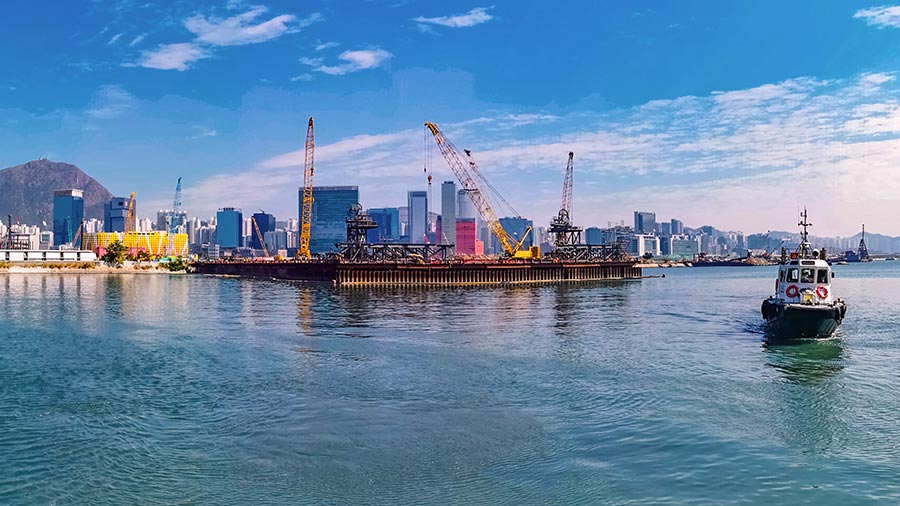Hong Kong has established Double Taxation Agreements (DTAs) with various nations to prevent double taxation and financial misconduct. These agreements promote cooperation with global tax authorities, impacting residents of Hong Kong and partner countries.
Critical points of Hong Kong's DTAs:
- Eliminate double taxation from overlapping tax jurisdictions.
- Clarify tax rules for international transactions.
- Resolve conflicts over taxpayer residence and income source.
- Provide avenues to address taxation issues.
- Prevent income flow tax avoidance.
- Enhance investment, trade, and personnel movement by reducing foreign withholding tax rates.
Double taxation occurs when income or profits are subject to taxation in multiple jurisdictions, leading to the same earnings being taxed more than once. Hong Kong residents do not face this issue and typically do not experience double taxation.
Double taxation agreement network
Double taxation, where income or profits are taxed in multiple jurisdictions, can create complex financial burdens. However, Hong Kong has established a unique taxation framework known as the territoriality basis, where only income or profit generated within its borders is subject to taxation. Income derived from sources outside Hong Kong by residents is generally exempt from tax. Therefore, Hong Kong residents typically avoid the specter of double taxation.
Hong Kong has signed comprehensive DTAs with 52 jurisdictions and is negotiating agreements with 19 others. The DTAs specify the tax rates for dividends, interest, royalties, and technical fees these countries can charge Hong Kong residents. The methods for eliminating double taxation are outlined in each DTA or the country's domestic law, with the tax credit method being the most common.
Hong Kong's Double Taxation Agreement (DTA) network provides a mechanism to mitigate the challenge of double taxation faced by global investors. Hong Kong follows a territoriality-based taxation system, taxing only income/ profit sourced in Hong Kong, thus avoiding double taxation for its residents.
Additionally, Hong Kong offers unilateral tax credit relief to its residents who operate businesses in other countries, ensuring they avoid issues with double taxation.
Furthermore, despite their worldwide taxation approach, many countries provide their residents operating businesses in Hong Kong with unilateral tax credit relief. Hong Kong even allows a deduction for foreign taxes paid on income that is also subject to Hong Kong taxation. This system dramatically alleviates concerns about double taxation for businesses operating within the region.
Nevertheless, the Hong Kong SAR government acknowledges the value of entering into comprehensive Double Taxation Agreements (DTAs) with its trading partners. These agreements clarify tax rights, help investors assess potential tax liabilities for their economic activities, and serve as an enticing incentive for overseas and Hong Kong-based companies to engage in international business.
As of June 2025, Hong Kong has inked comprehensive DTAs with 52 countries and regions. In addition, Hong Kong is in the process of negotiating comprehensive DTAs with 19 countries or regions, such as Germany, Norway, Cyprus, and Venezuela.
A unique challenge arises for airline operators due to the global nature of their operations, making them particularly vulnerable to double taxation. Recognizing the lengthy process of DTA negotiations, Hong Kong has adopted a policy of incorporating double taxation relief provisions for airline income into bilateral Air Services Agreements reached with aviation partners.
Shipping income is another area of concern. Hong Kong is actively negotiating double taxation relief for shipping income, particularly with jurisdictions that do not offer reciprocal tax exemptions or prefer bilateral agreements despite having such provisions. Some agreements even encompass both airline and shipping income.
Hong Kong’s onshore-offshore tax regime has garnered attention for its potential to reduce tax burdens by pricing intra-group transactions within Hong Kong companies. However, this has attracted increased scrutiny from the Hong Kong Inland Revenue Department (IRD) in recent years.
In response, the government introduced the Advance Pricing Arrangement (APA) program in 2012. This program, seen as a positive step for multinational companies, allows taxpayers to engage with tax authorities transparently and non-adversarially to achieve an optimal tax outcome. Notably, Hong Kong can only initiate an APA program with another country after signing a DTA with that country, further emphasizing the importance of these international agreements.
List of DTA agreements
Hong Kong has signed comprehensive DTAs with 52 countries or regions. In addition, Hong Kong is negotiating comprehensive DTAs with 19 countries or regions, such as Germany, Norway, Cyprus, and Venezuela.
|
Country / Region |
Status |
Effective From Year of Assessment |
|
Armenia |
In Force |
2026/2027 |
|
Austria |
In Force |
2012/2013 |
|
Bahrain |
In Force |
2026/27 |
|
Bangladesh |
In Force |
2025/2026 |
|
Belarus |
In Force |
2018/2019 |
|
Belgium |
In Force |
2004/2005 |
|
Brunei |
In Force |
2011/2012 |
|
Cambodia |
In Force |
2020/2021 |
|
Canada |
In Force |
2014/2015 |
|
Croatia |
In Force |
2025/2026 |
|
Czech Republic |
In Force |
2013/2014 |
|
Estonia |
In Force |
2020/2021 |
|
Finland |
In Force |
2013/2014 |
|
France |
In Force |
2012/2013 |
|
Georgia |
In Force |
2019/2020 |
|
Guernsey |
In Force |
2013/2014 |
|
Hungary |
In Force |
2012/2013 |
|
India |
In Force |
2013/2014 |
|
Indonesia |
In Force |
2013/2014 |
|
Ireland |
In Force |
2013/2014 |
|
Italy |
In Force |
2013/2014 |
|
Japan |
In Force |
2012/2013 |
|
Jersey |
In Force |
2013/2014 |
|
Korea |
In Force |
2012/2013 |
|
Kuwait |
In Force |
2013/2014 |
|
Latvia |
In Force |
2013/2014 |
|
Liechtenstein |
In Force |
2013/2014 |
|
Luxembourg |
In Force |
2013/2014 |
|
Macao SAR |
In Force |
2013/2014 |
|
China |
In Force |
2007/2008 |
|
Malaysia |
In Force |
2013/2014 |
|
Maldives |
Signed |
Pending |
|
Malta |
In Force |
2013/2014 |
|
Mauritius |
In Force |
2024/2025 |
|
Mexico |
In Force |
2014/2015 |
|
Netherlands |
In Force |
2012/2013 |
|
New Zealand |
In Force |
2012/2013 |
|
Pakistan |
In Force |
2013/2014 |
|
Portugal |
In Force |
2013/2014 |
|
Qatar |
In Force |
2013/2014 |
|
Romania |
In Force |
2013/2014 |
|
Saudi Arabia |
In Force |
2013/2014 |
|
Serbia |
In Force |
2013/2014 |
|
South Africa |
In Force |
2013/2014 |
|
Spain |
In Force |
2013/2014 |
|
Switzerland |
In Force |
2013/2014 |
|
Thailand |
In Force |
2013/2014 |
|
Türkiye |
Signed |
Pending |
|
United Arab Emirates |
In Force |
2013/2014 |
|
United Kingdom |
In Force |
2013/2014 |
|
Vietnam |
In Force |
2013/2014 |
|
Note: "In Force" indicates that the DTA has entered into force and is effective from the specified year of assessment. "Signed" indicates that the DTA has been signed but has not yet entered into force. |
||
Countries and Regions with DTAs Under Negotiation with Hong Kong
|
Country / Region |
Negotiations Scheduled |
Scheduled Negotiations Completed On |
|
Azerbaijan |
11–13 Jul 2023 (1st round) |
13 Jul 2023 |
|
Barbados |
24–28 Mar 2025 (1st round) |
28 Mar 2025 |
|
Cabo Verde |
22–26 Jan 2024 (1st round) |
26 Jan 2024 |
|
Cyprus |
29–31 Mar 2016 (1st round); 30 Nov–3 Dec 2021 (2nd round) |
30 Mar 2016; 3 Dec 2021 |
|
Germany |
16–20 Jun 2014 (1st round); 2–6 Mar 2015 (2nd round) |
20 Jun 2014; 6 Mar 2015 |
|
Israel |
20–24 Jan 2014 (1st round) |
23 Jan 2014 |
|
Jordan |
15–17 May 2023 and 22–24 May 2023 (1st round) |
22 May 2023 |
|
Kyrgyzstan |
17–21 Jan 2022 (1st round); 15–17 Jan 2025 (2nd round) |
21 Jan 2022; 17 Jan 2025 |
|
Lithuania |
9–13 Dec 2019 (1st round) |
12 Dec 2019 |
|
Mongolia |
14–15 Mar 2024 (1st round) |
15 Mar 2024 |
|
Morocco |
23–27 Jun 2025 (1st round) |
27 Jun 2025 |
|
Nigeria |
6–10 Feb 2017 (1st round); 5–8 Jul 2021 (2nd round) |
9 Feb 2017; 8 Jul 2021 |
|
North Macedonia |
9–12 Jun 2015 (1st round) |
12 Jun 2015 |
|
Norway |
10–14 Dec 2018 (1st round) |
13 Dec 2018 |
|
Philippines |
21–23 May 2025 (1st round) |
– |
|
Rwanda |
18–22 Nov 2024 (1st round) |
22 Nov 2024 |
|
Turkmenistan |
18–22 Dec 2023 (1st round) |
22 Dec 2023 |
|
Ukraine |
12–16 Jul 2021 (1st round) |
16 Jul 2021 |
|
Venezuela |
6–10 May 2024 (1st round) |
10 May 2024 |
Tax rates for dividends, interest, royalties, and technical fees under DTAs
The following table shows the maximum tax rates those countries/regions with Comprehensive DTAs with Hong Kong can charge a Hong Kong resident on payments of dividends, interest, royalties, and technical fees.
|
Country/Region |
Effective Year of Assessment |
Dividends (%) |
Interest (%) |
Royalties (%) |
Technical Fees (%) |
|
Armenia |
2026/27 |
0/5 |
5 |
5 |
N/A |
|
Austria |
2012/13 |
0/10 |
- |
3 |
N/A |
|
Bahrain |
2026/27 |
- |
- |
5 |
N/A |
|
Bangladesh |
2025/26 |
10/15 |
10 |
10 |
10 |
|
Belarus |
2018/19 |
5 |
5 |
3/5 |
N/A |
|
Belgium |
2004/05 |
0/5/15 |
10 |
5 |
N/A |
|
Brunei |
2011/12 |
- |
5/10 |
5 |
15 |
|
Cambodia |
2020/21 |
10 |
10 |
10 |
10 |
|
Canada |
2014/15 |
5/15 |
10 |
10 |
N/A |
|
Croatia |
2025/26 |
5 |
5 |
5 |
N/A |
|
Czech |
2013/14 |
5 |
- |
10 |
N/A |
|
Estonia |
2020/21 |
0/10 |
0/10 |
5 |
N/A |
|
Finland |
2019/20 |
5/10 |
- |
3 |
N/A |
|
France |
2012/13 |
10 |
10 |
10 |
N/A |
|
Georgia |
2022/23 |
5 |
5 |
5 |
N/A |
|
Guernsey |
2014/15 |
- |
- |
4 |
N/A |
|
Hungary |
2012/13 |
5/10 |
5 |
5 |
N/A |
|
India |
2019/20 |
5 |
10 |
10 |
10 |
|
Indonesia |
2013/14 |
5/10 |
10 |
5 |
N/A |
|
Ireland |
2012/13 |
- |
10 |
3 |
N/A |
|
Italy |
2016/17 |
10 |
12.5 |
15 |
N/A |
|
Japan |
2012/13 |
5/10 |
10 |
5 |
N/A |
|
Jersey |
2014/15 |
- |
- |
4 |
N/A |
|
Korea |
2017/18 |
10/15 |
10 |
10 |
N/A |
|
Kuwait |
2014/15 |
5 |
5 |
5 |
N/A |
|
Latvia |
2018/19 |
0/10 |
0/10 |
0/3 |
N/A |
|
Liechtenstein |
2012/13 |
- |
- |
3 |
N/A |
|
Luxembourg |
2008/09 |
0/10 |
- |
3 |
N/A |
|
Macao SAR |
2021/22 |
5 |
5 |
3 |
N/A |
|
China |
2007/08 |
5/10 |
7 |
5/7 |
N/A |
|
Malaysia |
2013/14 |
5/10 |
10 |
8 |
5 |
|
Maldives |
Pending |
5/10 |
10 |
10 |
10 |
|
Malta |
2013/14 |
- |
- |
3 |
N/A |
|
Mauritius |
2024/25 |
0/5 |
5 |
5 |
N/A |
|
Mexico |
2014/15 |
- |
4.9/10 |
10 |
N/A |
|
Netherlands |
2012/13 |
0/10 |
- |
3 |
N/A |
|
New Zealand |
2012/13 |
0/5/15 |
10 |
5 |
N/A |
|
Pakistan |
2018/19 |
10 |
10 |
10 |
12.5 |
|
Portugal |
2013/14 |
5/10 |
10 |
5 |
N/A |
|
Qatar |
2014/15 |
- |
- |
5 |
N/A |
|
Romania |
2017 |
3/5 |
3 |
3 |
N/A |
|
Saudi Arabia |
2019/20 |
5 |
- |
5/8 |
N/A |
|
Serbia |
2021/22 |
5/10 |
10 |
5/10 |
N/A |
|
South Africa |
2016/17 |
5/10 |
10 |
5 |
N/A |
|
Spain |
2013/14 |
0/10 |
5 |
5 |
N/A |
|
Switzerland |
2013/14 |
0/10 |
- |
3 |
N/A |
|
Thailand |
2006/07 |
10 |
10/15 |
5/10/15 |
N/A |
|
Türkiye |
Pending |
5/10 |
7.5/10 |
7.5/10 |
N/A |
|
UAE |
2016/17 |
5 |
5 |
5 |
N/A |
|
United Kingdom |
2011/12 |
0/15 |
Domestic Rate |
3 |
N/A |
|
Vietnam |
2010/11 |
10 |
10 |
7/10 |
N/A |
|
For detailed information and any updates, please refer to the official source: IRD : Notes to Tax Rates for Dividends, Interest, Royalties and Technical Fees |
|||||
Double taxation elimination methods
The methods of eliminating double taxation are stipulated in the specific DTA or a country’s domestic law.
Tax credit method
In most treaties signed by Hong Kong, residents can avoid double taxation through a tax credit.
Under the credit method, Hong Kong SAR shall grant credit for the tax paid in a foreign jurisdiction outside of Hong Kong regarding income derived by a person who is a resident of the Hong Kong SAR from sources of that foreign jurisdiction.
However, the credit should not exceed the amount of Hong Kong SAR’s tax computed for that income following the tax laws.
Tax exemption method
In addition to tax credit relief, double taxation can be eliminated by tax exemption methods, reduced tax rates, as well as relief by deductions. However, these methods are not used as commonly as the tax credit method.
Who can enjoy the benefits of DTAs?
Under most DTAs, only Hong Kong residents can claim tax benefits under the comprehensive DTAs. Taxpayers should refer to the protocol of the relevant DTA to check whether they qualify as Hong Kong residents.
In general, the following individuals can be regarded as Hong Kong Residents and thus can enjoy DTA benefits:
- Individual who ordinarily resides in Hong Kong;
- Individual who stays in Hong Kong for more than 180 days during a year of assessment or for more than 300 days in two consecutive years of assessment – one of which is the relevant year of assessment;
- Company/partnership/trust/body of persons incorporated or constituted in Hong Kong; and
- Company/partnership/trust/body of persons incorporated or constituted outside Hong Kong but managed or controlled in Hong Kong.
Applying for Certificate of Resident Status
A Certificate of Resident Status (CoRS) is a document issued by the competent authority of the Hong Kong SAR to a resident who requires proof of resident status to claim tax benefits under the comprehensive DTA.
The Certificate of Resident Status should constitute sufficient proof of the resident status of a Hong Kong resident. The competent authority of Hong Kong will issue a Certificate of Resident Status after the DTA between Hong Kong and the relevant jurisdiction has become effective.
Applicants should be aware that a Certificate of Resident Status issue will not guarantee that they will succeed in their claim to benefits under the relevant DTA. It will be up to the treaty partner to determine whether all the applicable conditions are fulfilled and benefits can be granted.
To apply for the Certificate of Resident Status, the applicant needs to complete the appropriate form:
|
DTA Partner |
Form |
|
|
|
Company / Partnership / Trust / Body of Persons |
Individual |
|
The Mainland of China (Mainland) |
IR1313A |
IR1314A |
|
Other Jurisdictions |
IR1313B |
IR1314B |
The completed form should be sent to the Tax Treaty Section of the IRD, and a Certificate of Resident Status shall be issued within 21 working days after receipt of a properly completed application. If further information is needed or the application cannot be accepted, a notification of decision by the assessing officer will be given within the timeframe.
For applications related to the DTA between the Chinese Mainland and Hong Kong, a CoRS issued for a specific calendar year generally serves as proof of Hong Kong resident status for that year and the two succeeding calendar years.
Advance Pricing Agreements
Hong Kong’s onshore-offshore tax regime often reduces the tax burden for those who operate through Hong Kong companies by pricing intra-group transactions. This has led to heightened transfer pricing scrutiny from the Hong Kong Inland Revenue Department in recent years.
Consequently, the Advance Pricing Arrangement (APA) program was introduced to Hong Kong. It was widely regarded as a welcome development for multinational companies, as it offers a non-adversarial approach in which taxpayers can transparently engage with tax authorities to achieve an optimal tax outcome.
An APA is an agreement that determines an appropriate set of criteria (e.g., transfer pricing method, external data, reasonable adjustments, critical assumptions as to future events) to determine the pricing of related party transactions over a fixed period. This is either three or five years.
Hong Kong can only start an APA program with another country after signing a DTA with the concerned country.












